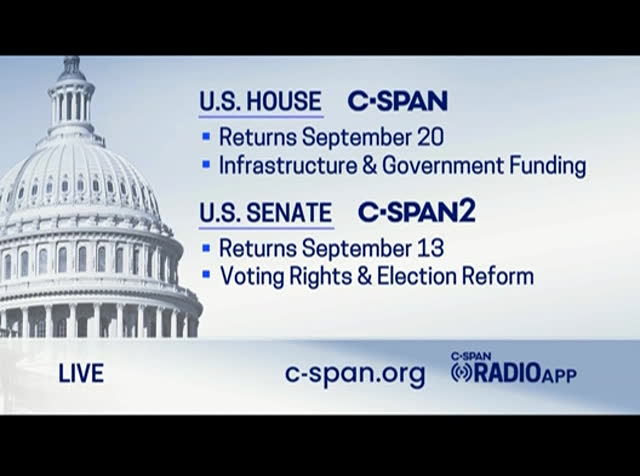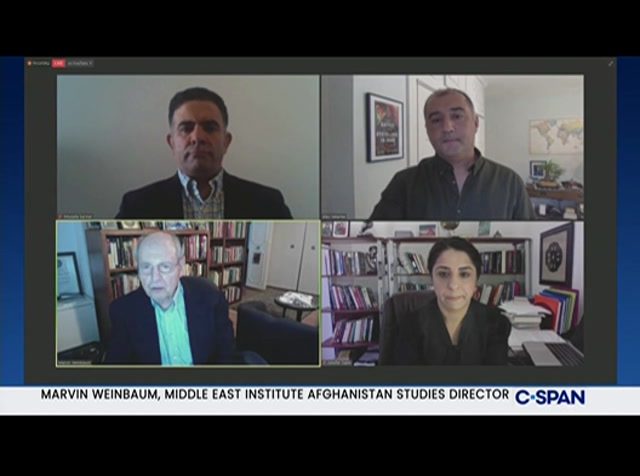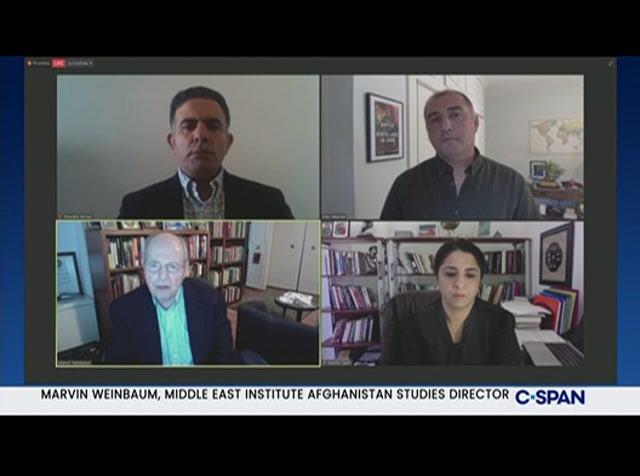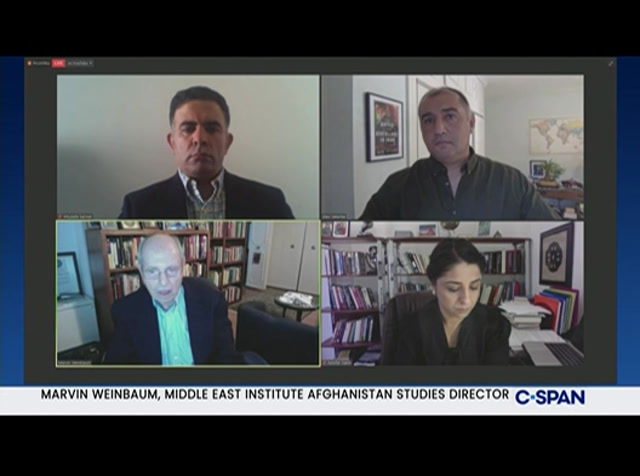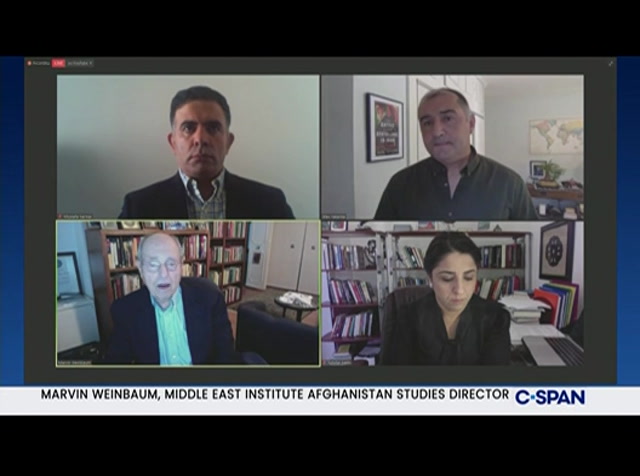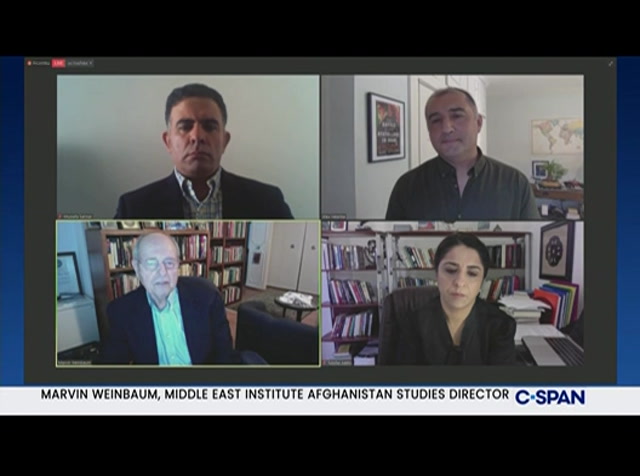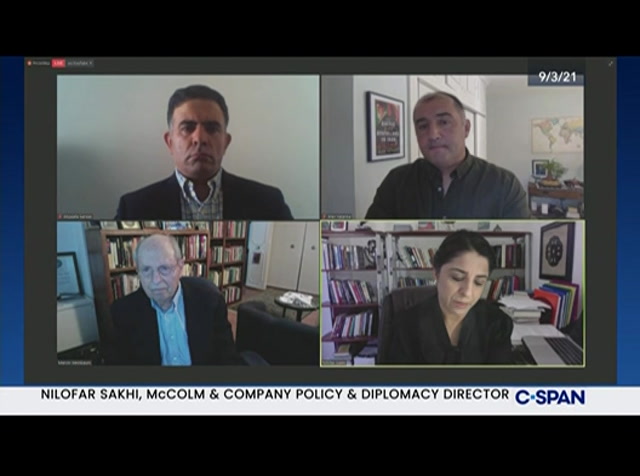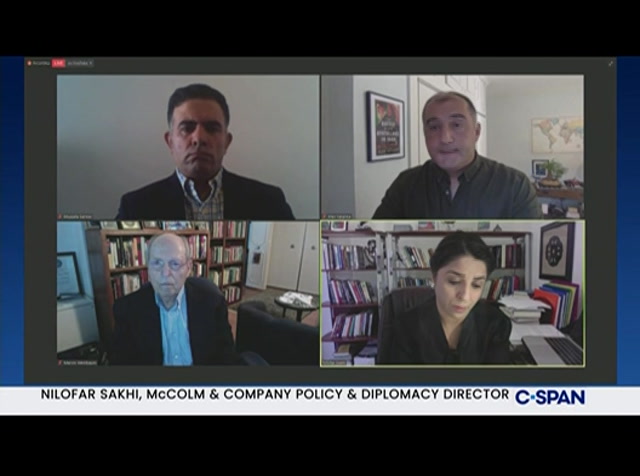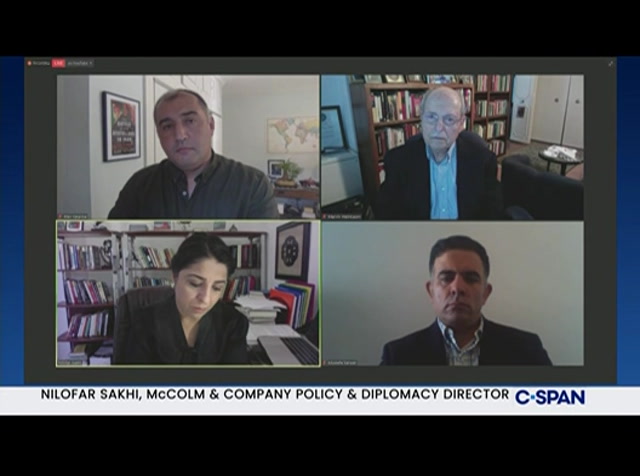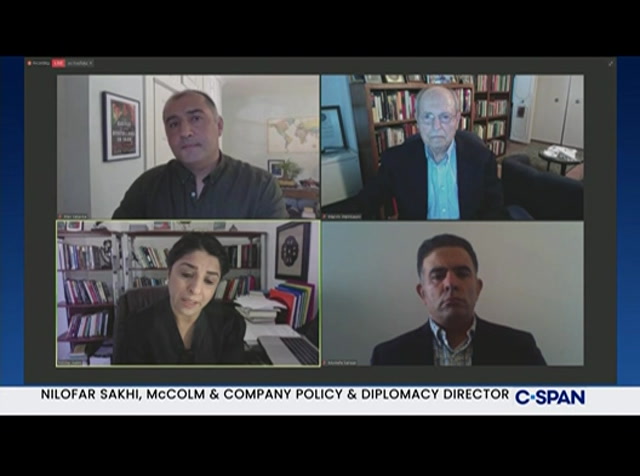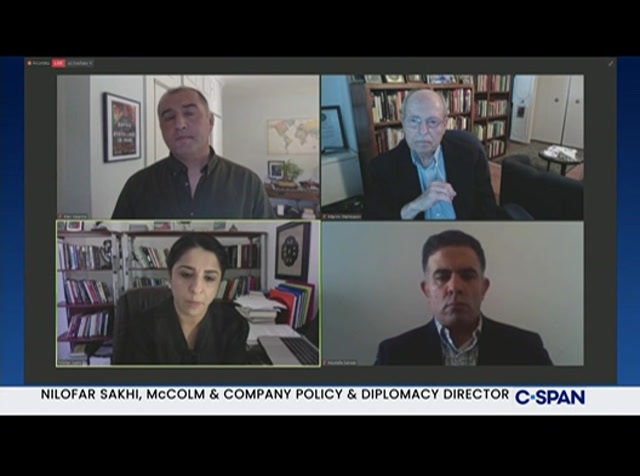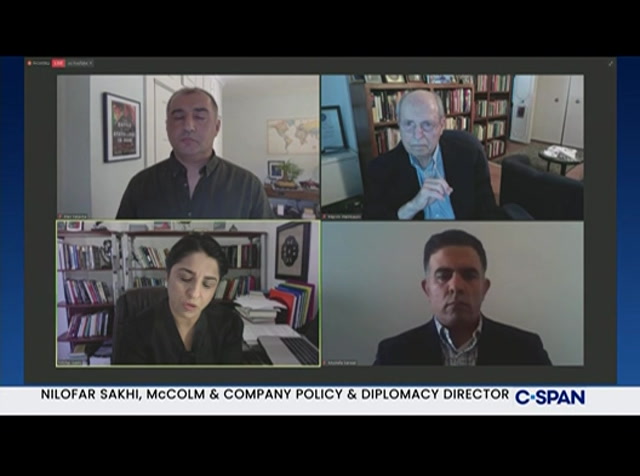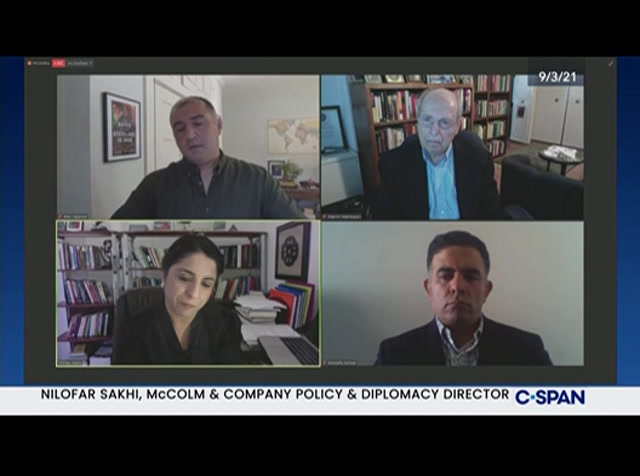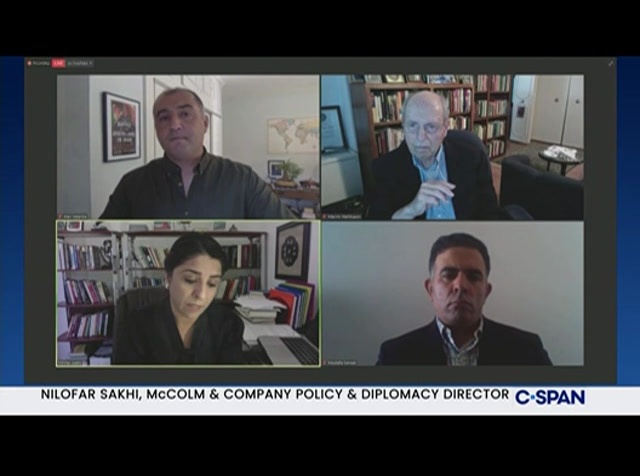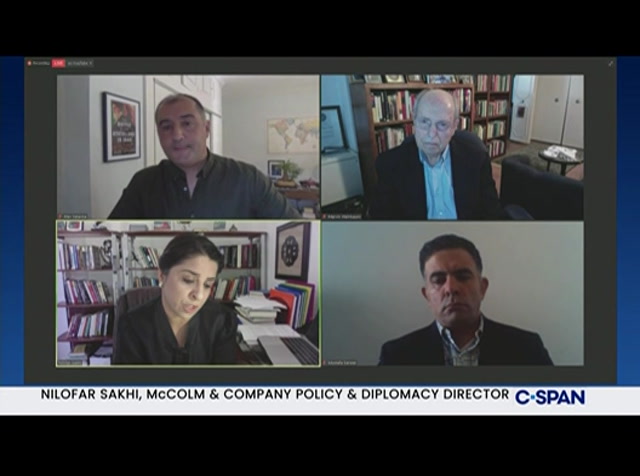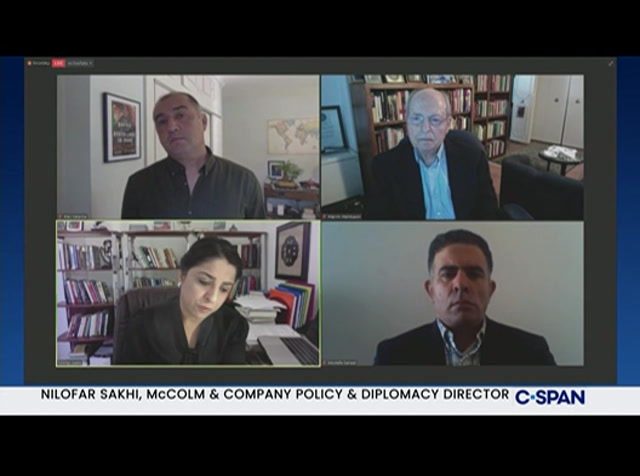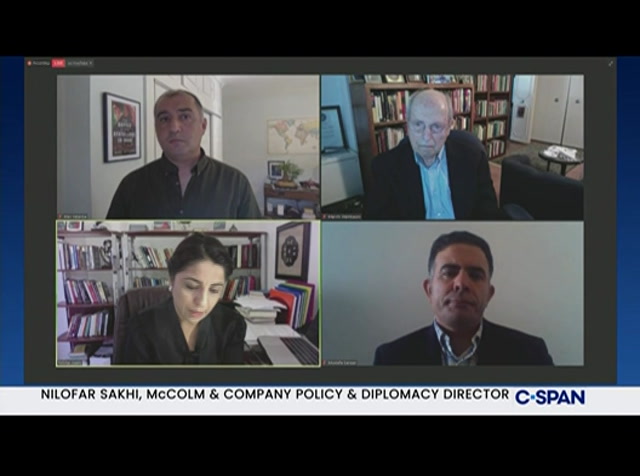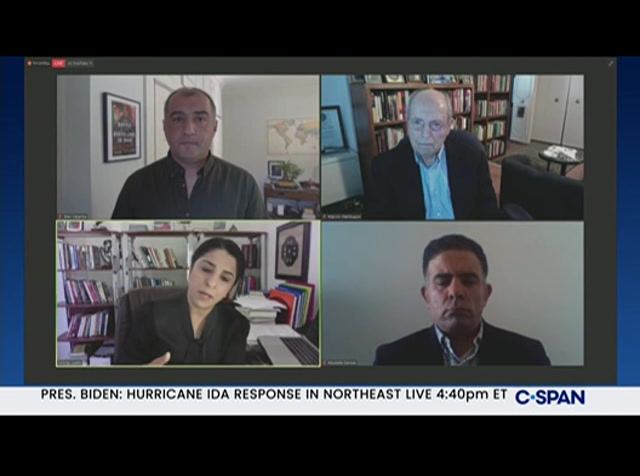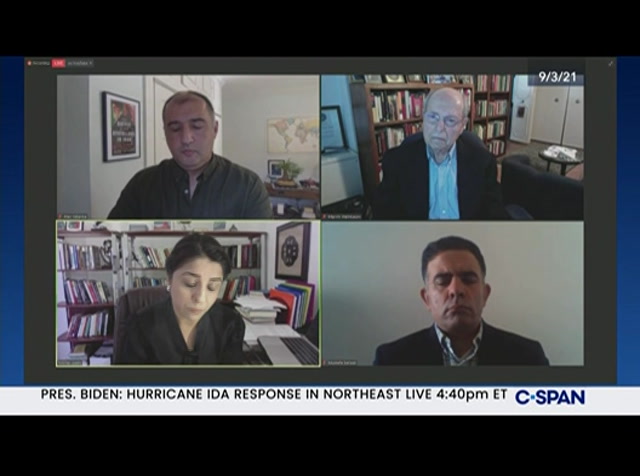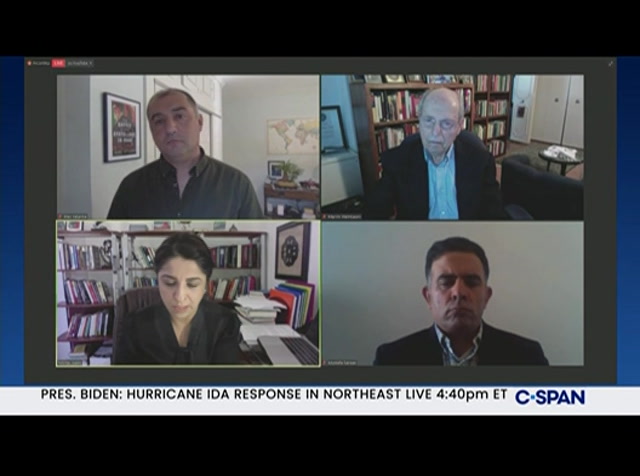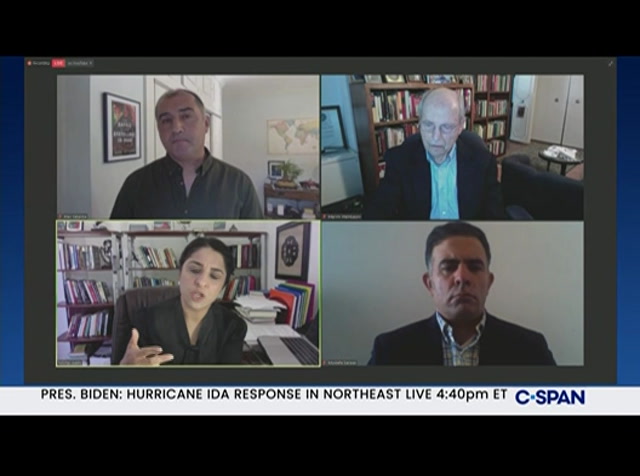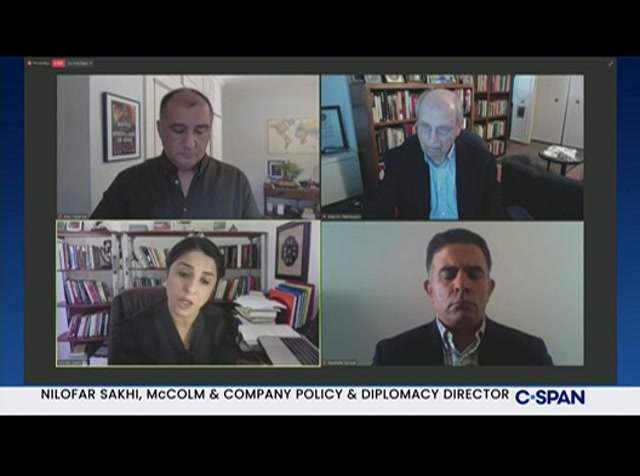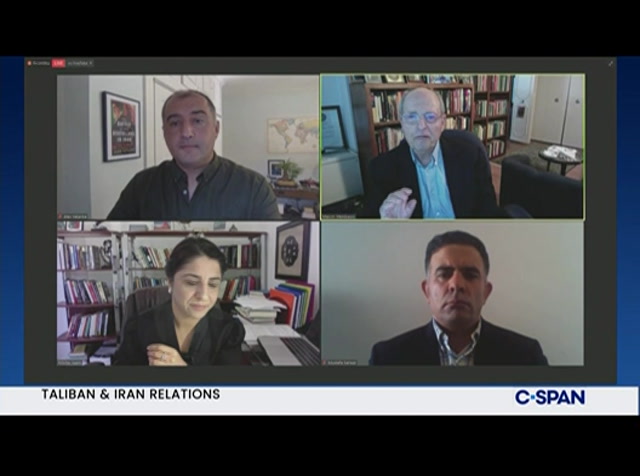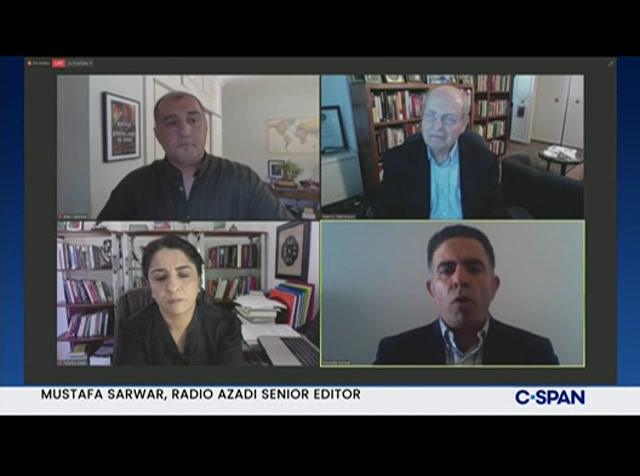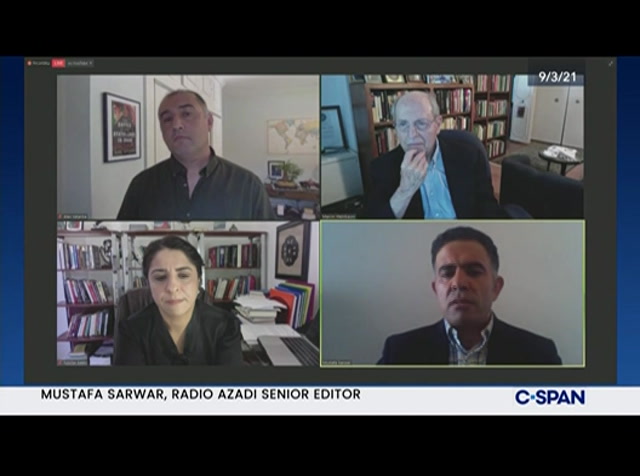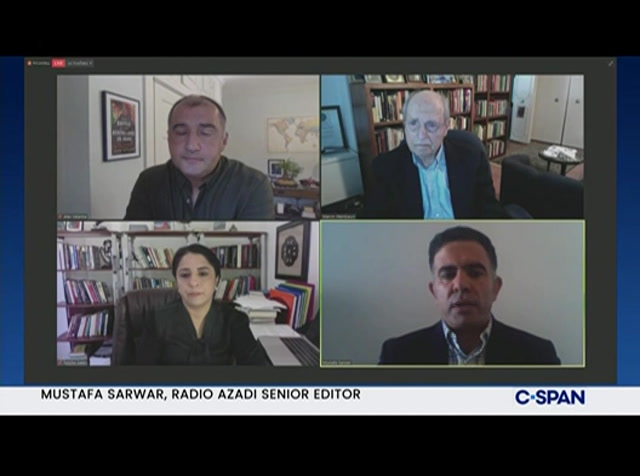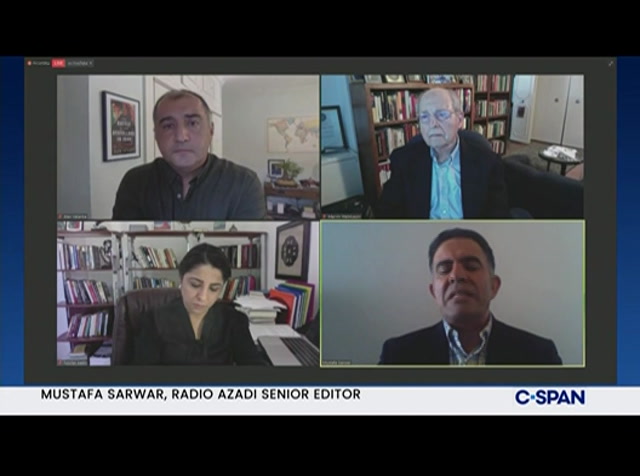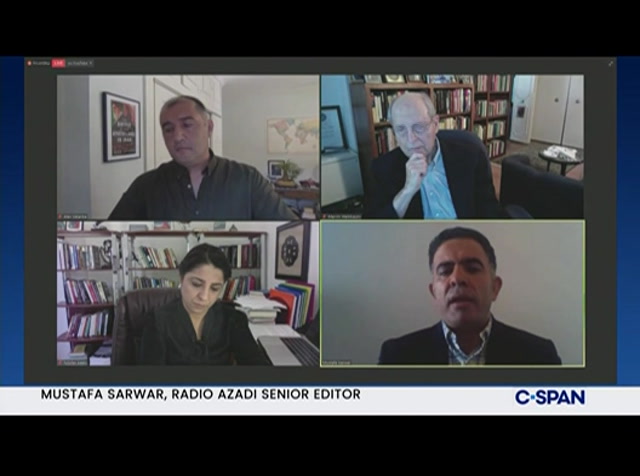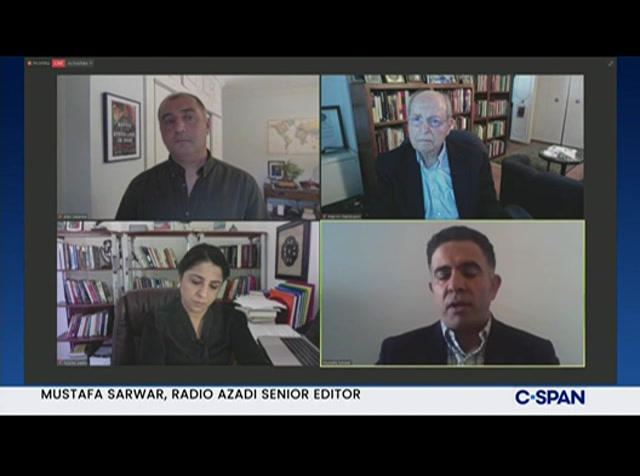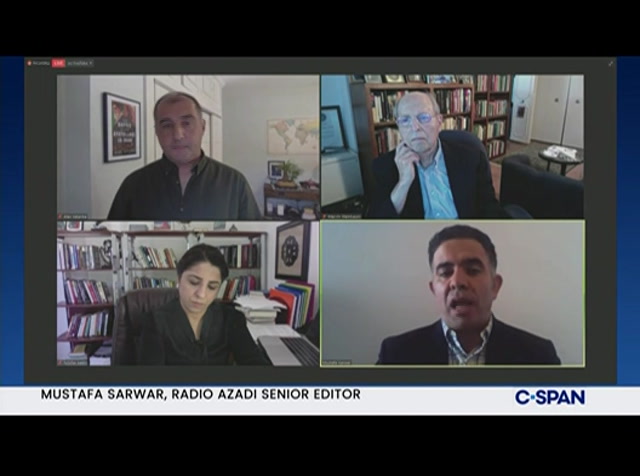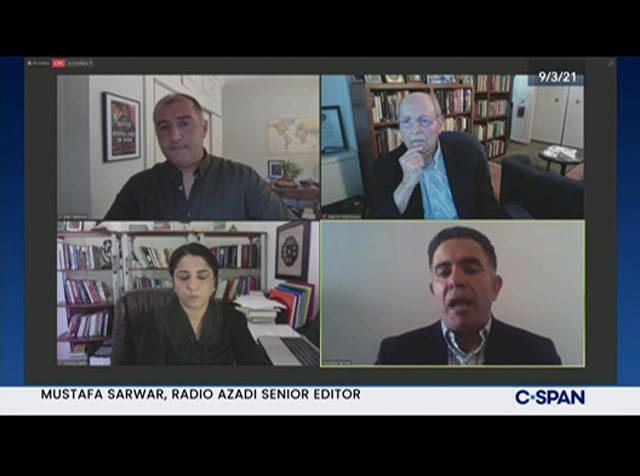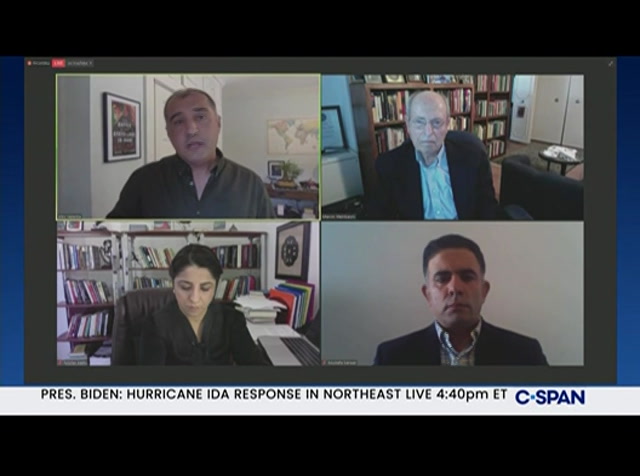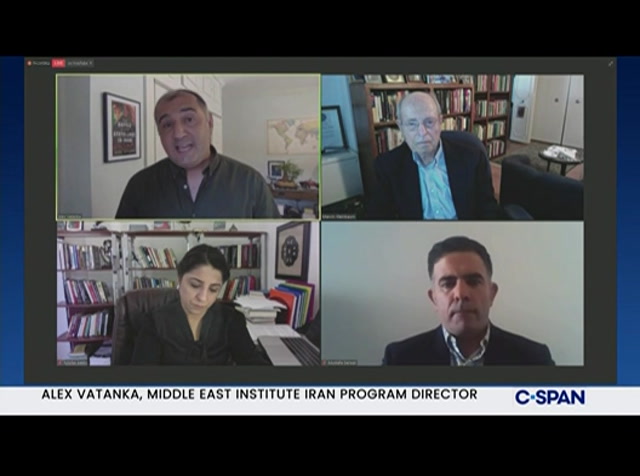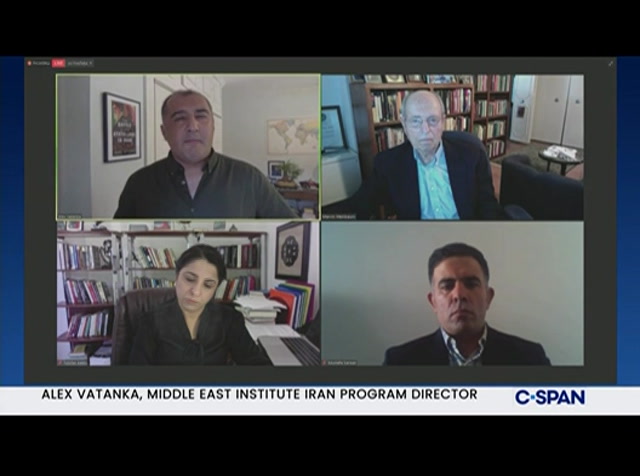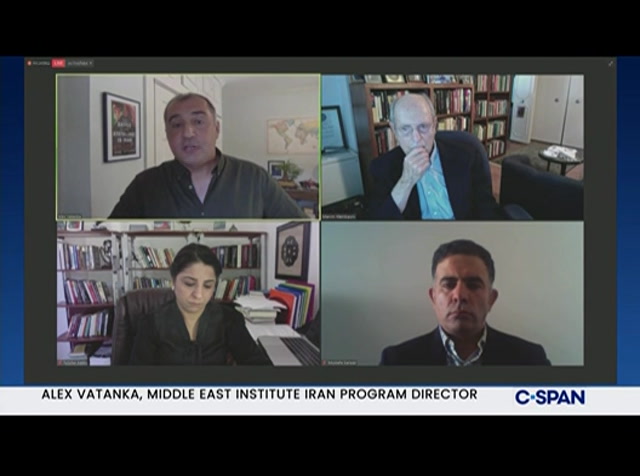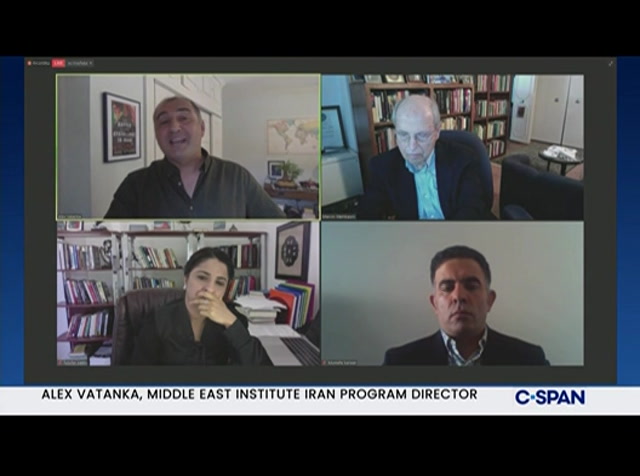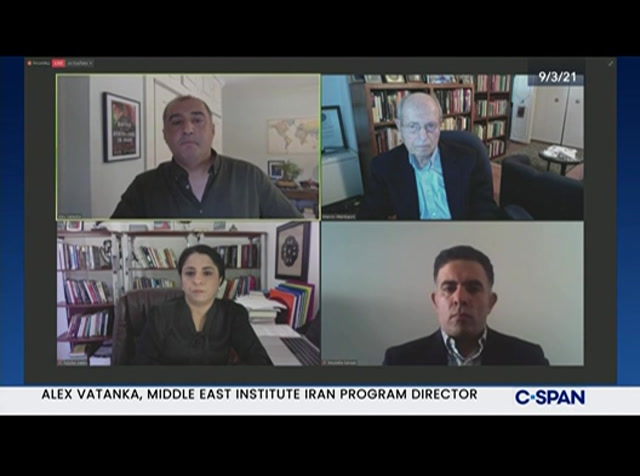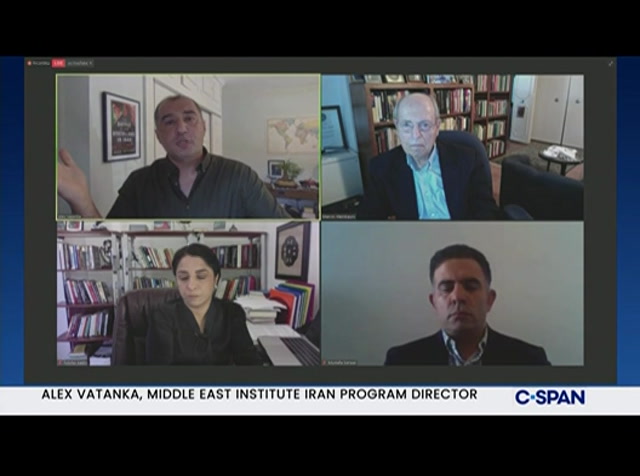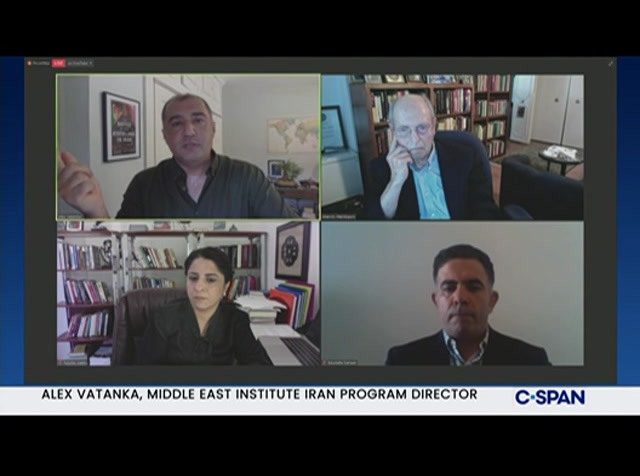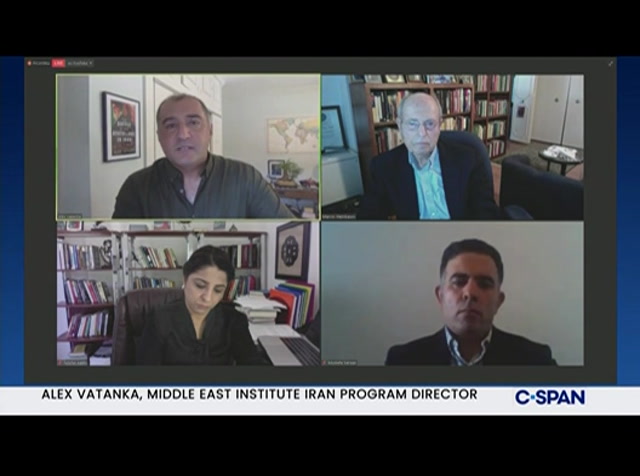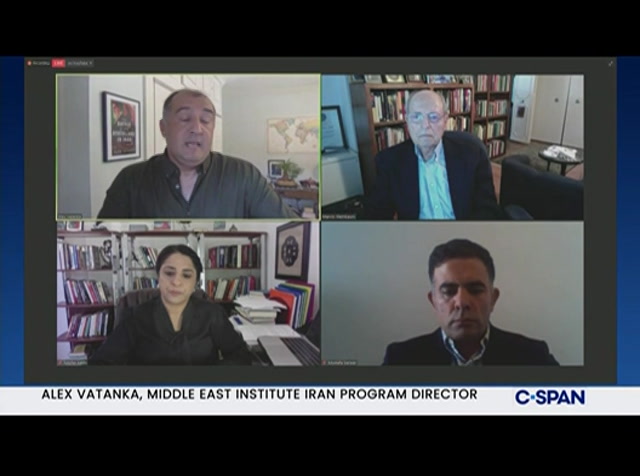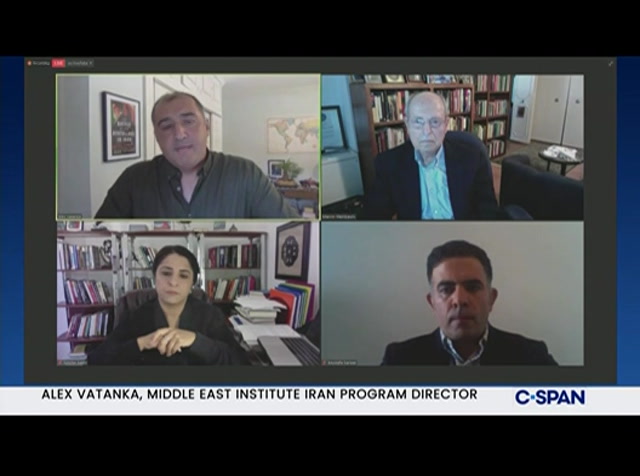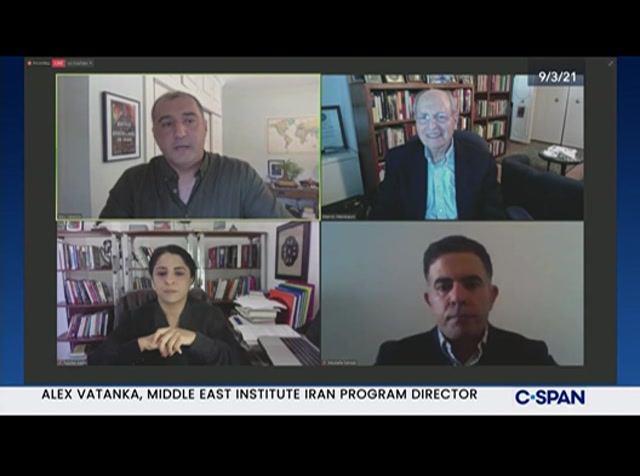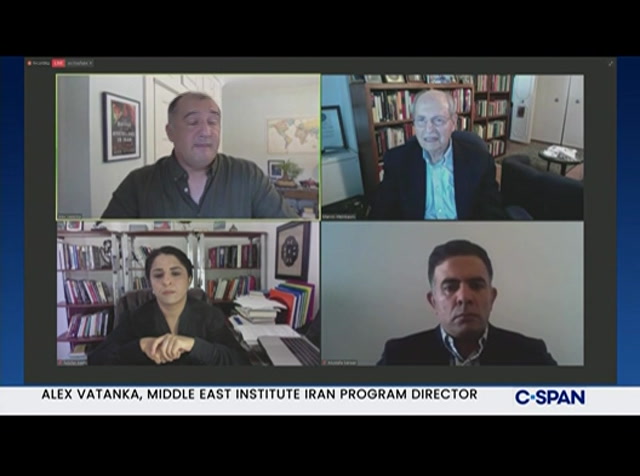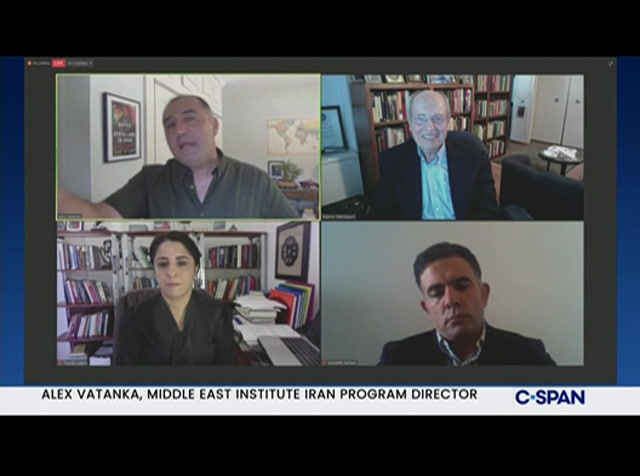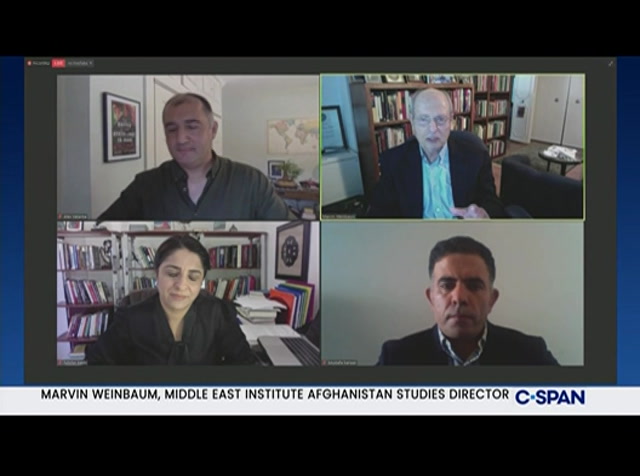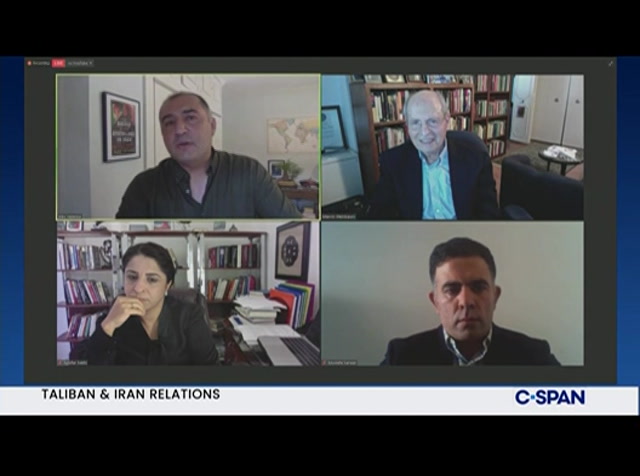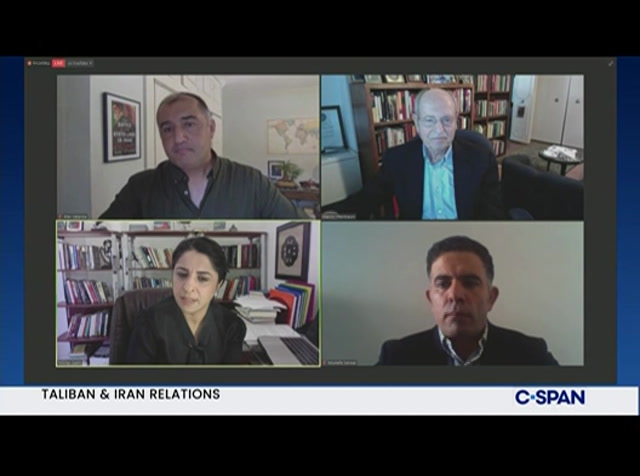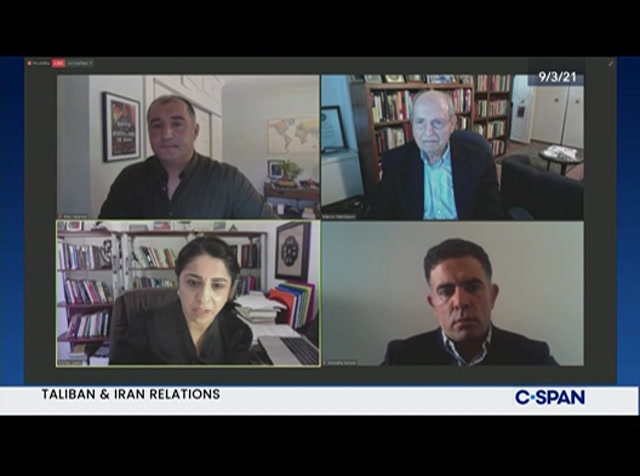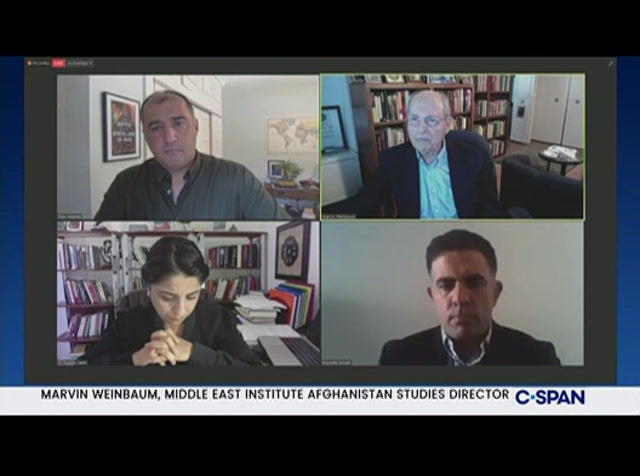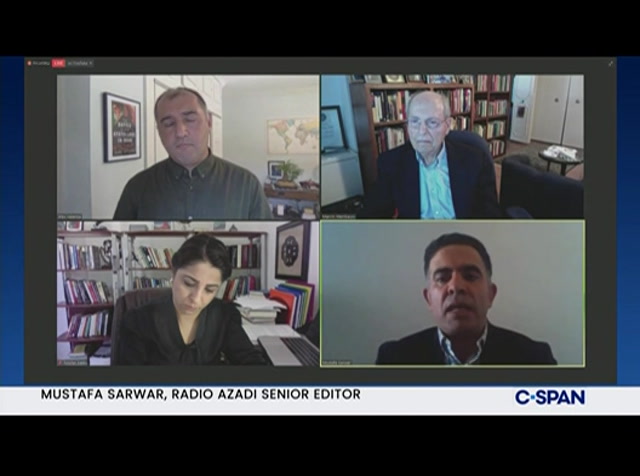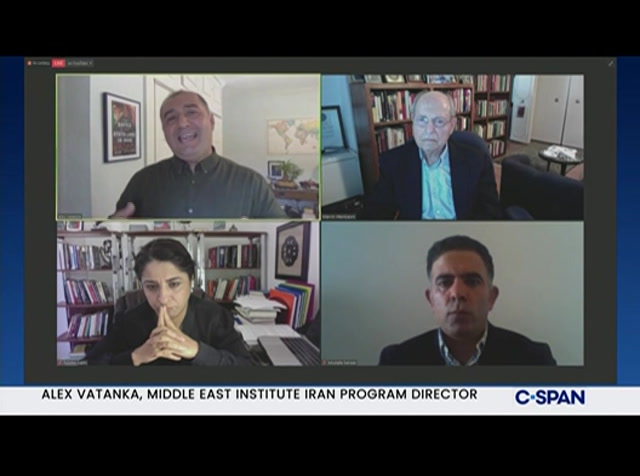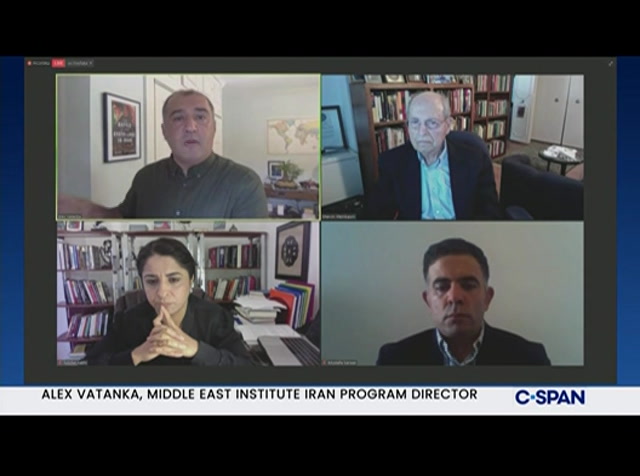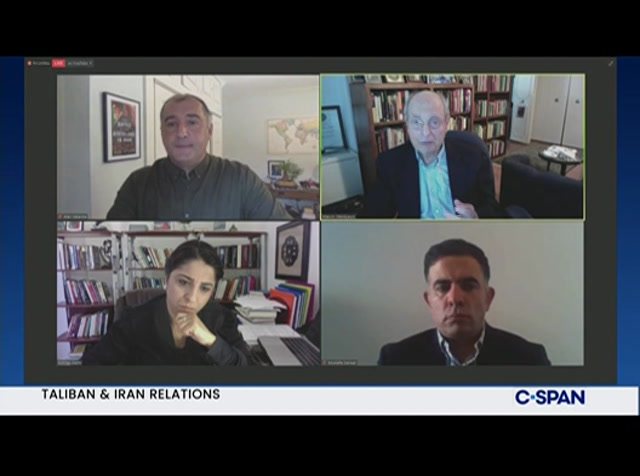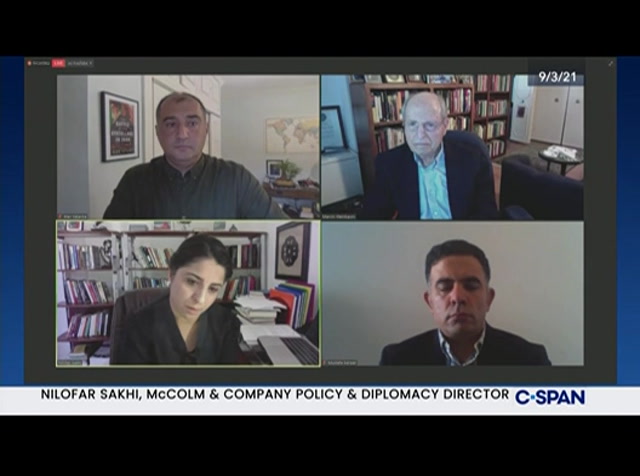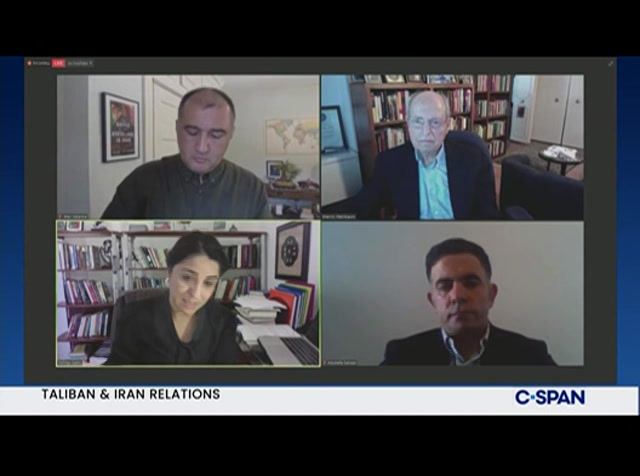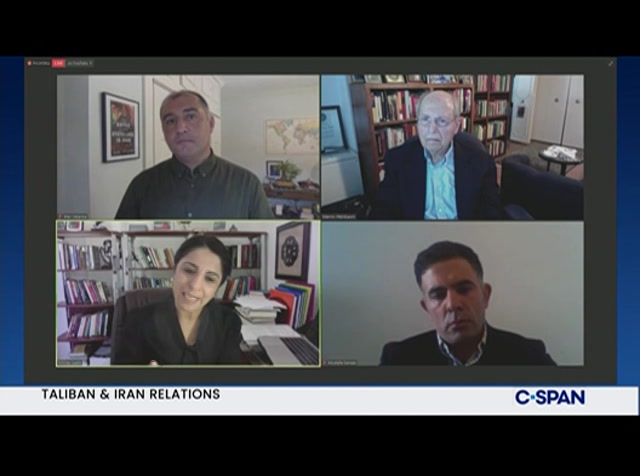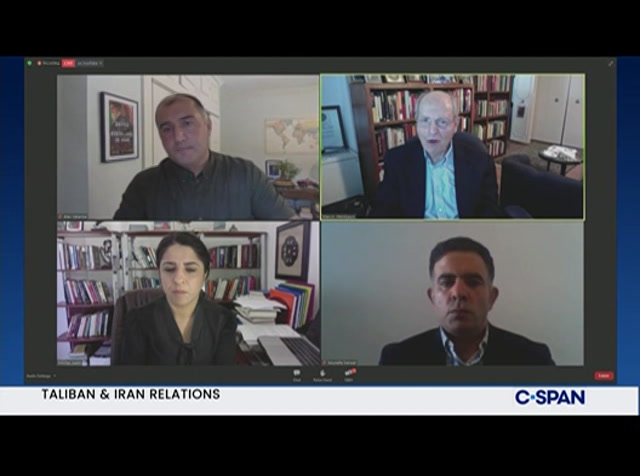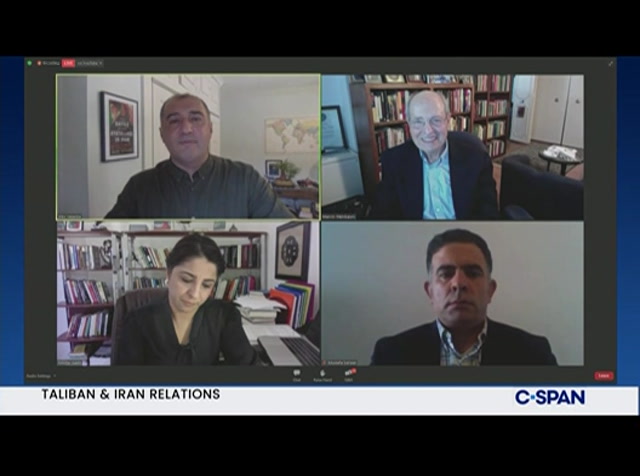tv Middle East Experts Discuss the Taliban Iran CSPAN September 7, 2021 3:29pm-4:28pm EDT
3:29 pm
>> the u.s. house -- will return on september 20. later in the month, members are expected to vote on infrastructure and government funding legislation. the senate returned september 13 for debate on president biden's nominations and voting rights and election reform legislation. watch live gavel-to-gavel coverage of the house on c-span and watched the senate on c-span two, online at c-span.org, or listen on the radio app. c-span --c-span's online store has a collection of spaceman products. browse to see what is new. your support will support our operations and you have time to order the congressional directory with contacts from members of congress in the biden administration. go to cspanshop.org. up next, the middle east institute hosted a discussion with a number of middle east experts on the taliban takeover of afghanistan and the
3:30 pm
applications for iran and other neighboring countries. this is just over one hour. >> they are looking for signs of what the intel up test taliban intends to willpower. their concerns over refugee and increasing drug trafficking. the possibility -- they may strengthen under a taliban regime. and that there may be urgency
3:31 pm
exported to countries in the neighborhood and beyond. immediately, they have to decide what kind of assistance if any they will provide and expect in return. iran will be looking at how the new regime treats its minority, and we will see countries in the region -- whether countries in the region will be working together to ensure a stable afghanistan which is in all of their interests, for different reasons or that they would be , pursuing their own interests and creating new sources of tension. for these questions and others, we have a panel this morning that is well-qualified to provide some of the answers. after presentations by the panelists and some questions of my own, we will try to answer as
3:32 pm
many questions as possible in the hour that we have. to submit your questions, please use zooms q and a future which you can find on your resume screen. -- zoom screens. feel free to ask questions anytime during the panel. for those calling in by phone or watching the panel livestream, you can ask a question by emailing -- if you have any technical issues, please also use that -- events@mei.edu. and now allow me to introduce , the panel. we have a resident from the atlantic council south facing -- asia center director of , policy and diplomacy of macomb and company, a lecturer at george washington university school of international affairs.
3:33 pm
next, a broadcaster and journalist out of prague. he began working with the radio in 2002 it he has been covering a wide range of topics on afghanistan, including stories related to afghan women and youth and issues related to refugees in afghanistan and a borrowed -- abroad. alex is a director of the iran program and a senior fellow with a front tier europe initiative.
3:34 pm
-- frontier europe initiative. he specializes in middle east regional affairs with a focus on iran, a prolific author. his latest book came at just a few months ago. it is the battle of the ayatollahs in iran, united states foreign policy and political rivalry since 1979. now i will just say that i am , marvin weinbaum, and now i'm -- the director of afghanistan and pakistan studies at the middle east institute. and now i'm going to turn to our panelists and begin with asking --to lead us off. >> thank you. hello, everyone.
3:35 pm
thank you for organizing this event. thank you so much, dr. one bomb -- weinbaum. i will start with iran's strategy. a couple of months back i was looking at the role of the regional powers, and it struck me of knowing that how these powers are trying to -- i will come to that at the end, but let me start with some major strategy against iran around the ideology and economy. -- strategy of interest in iran around the ideology and economy. and the trends that iran will also see, ideology, security and
3:36 pm
-- the threats that iran also sees from afghanistan are around these three major areas, ideology, security, and economy. let me start with the security element, and that is so much connected to the ideology element. iran has always welcomed these -- the departure of the u.s. forces, there is no doubt. but it has consumed the path of tension with the taliban back in -- the reemergence of sunni she at tension with the taliban back in power. -- shia tension with the taliban back in power. the threats relating to the taliban takeover and the emergent of anti-iran sentiment, it is something that is a major threat moving forward, going forward. it goes back to the past where
3:37 pm
3:38 pm
relationship has been complicated in the past, but recently, the political processes come of that some call the peace processes, during these years iran has demonstrated support to the taliban. i think that strategy is moot because after one year of the talks, and especially -- tehran believe that the taliban would be the next power order. [indiscernible] -- around the economic asset that iran has.
3:39 pm
the tension in afghanistan -- the taliban has demonstrated flexibility and expressed flexibility in terms of [indiscernible] , but one should be skeptical at this moment of any kind of political statement about their flexibility. they went to get international recognition, the flow of money, so whatever statement they are making right now, with that it -- one can hardly trust in those. with that, it is hard to see how taliban goes forward, when their government will be in place, how they will treat this shiite
3:40 pm
population. and whether that will be a track forward of anti-iran sentiment. based on the previous atrocities of the taliban with this population, they could predict that they would not be flexible moving forward, but again, as they need international recognition and money to come, they might change. so the taliban be flexible if taliban it will include this population and whatever government they form, and the state would not have adverse policies to them, i think that ensures a positive signal of the
3:41 pm
relationship between the taliban and iran. if taliban would have adverse policies towards the shiite, that would create a sectarian aspect and that conflict could be a threat to iran security going forward. so we will need to wait and see their behavior with this part of the population that is around the ideology that i talked about, then that would further iran being able to submit the policy going forward. that is one element. [indiscernible] that relationship might take a
3:42 pm
shape and iran will be able to implement the interests of our allies. economic interests that we do not have in afghanistan. if that turns in a different way it could create conflict. , on the other hand, there is also operation that maybe this conflict inside the taliban could have impact on that part of the population. that conflict is one thing that we will need to wait in see in look closely at how the taliban -- wait and see and look closely at how the taliban behavior will be issued.
3:43 pm
the other element is currently the real issue around iranian -- it goes back again to the security elements. we all know that the economy has been hit hard by wide range of sanctions. iran is in crisis right now because of the sanctions, so the sanctions do not allow them to get any more funding and aid, and therefore the flow has showed there is a high number of the population migrating to a ran out that the evacuation is being completed and now people are going to pakistan to escape the taliban.
3:44 pm
with that flow of refugees to a ran, iran will have more social economic issues, and that will cause more security issues inside. inside iran. and also issues with the drug trafficking. iran is concerned with this element, and they have to address that. they need to do it to impede further socioeconomic chaos good -- chaos. the third interest that ran has is the economic interest, and
3:45 pm
iran and afghanistan it shared a border, and that includes several lucrative trade routes. if -- afghanistan was one of the largest destinations for irani and non-oil exports, [indiscernible] huge money for iran. due to internal economic issues in a ran -- iran, which may depreciate significantly, the
3:46 pm
iranian goods are more affordable to some buyers and afghanistan is a good consumer market, has been a good consumer market for tehran. i was just looking at the recent report that the tension from afghanistan [indiscernible] since then the reports show that that rate has dropped up, and -- jumped up, and exports dropped down, and of course that has had a huge impact on the trade and a huge impact on the goods transported to that region. -- the western region. the instability in afghanistan, in conclusion, could have a very negative impact on trade in iran markets and they will lose
3:47 pm
its market if that tension arises again. these three major interests make -- ideology, security, and economy, make iran to have a policy of cooperation, a policy of flexibility with the next powerholder even if complication exists, and even if they do not like the taliban, even if they are anti-taliban, so iran has to cement a relationship with the taliban. from the national interest perspective [indiscernible] -- and the second to have a deeper diplomatic strategy relationship with the taliban in
3:48 pm
3:49 pm
investment with iran, all of these elements i see that iran is in the process, from these -- [indiscernible] -- in conclusion, i analyze that it seems that iran's foreign policy in the region be based on cooperation with china and russia and that the peaceful policy that they used to have and that makes sense, especially , with another dominant version. -- extreme version of sunni is in power next-door.
3:50 pm
on the other hand, pakistan is more closer to the taliban than iran, so iran itself in the -- cannot isolate itself in the current scintillation -- situation. it makes a lot of sense for iran to have a close relationship with them. we will have to wait and see. especially with all the investments we are making. you're a new. -- on mute. dr. weinbaum: thank you so much.
3:51 pm
it was very comprehensive, and i'm sure there's a great deal to discuss, and mustafa will take -- so far will take us in the direction. you in that direction. ms. sakhi: >> thank you very much for having me on this timely discussion. as you know, the withdrawal of all u.s. troops from afghanistan after almost 20 years of war and the war -- in the war shattered country has raised questions and concerns both inside and outside afghanistan. many ask what will happen next and what the future will hold for them. at the regional level, many stakeholders including iran,
3:52 pm
they have their own it interest. they were repeatedly calling for responsible withdrawal from afghanistan. one interpretation of the phrase responsible withdrawal wise afghanistan should not be plunged into another bloody civil war and further instability. and should not again be, a safe haven for international terrorists. the united states has repeatedly time and again said that the main purpose of this presence in afghanistan was to prevent it from ever becoming a safe haven for international terrorists. every country in the region -- has specific objectives. in afghanistan, there
3:53 pm
inextricably linked to national security interest. there are major concerns in afghanistan at the security of the eastern borders, the presence of sunni extremist fighters with the islamic states radical groups and third, the influx of the new wave of afghan refugees -- a large territory situated in parts of today's afghanistan and iran. isis repeatedly targeted the shiite community in afghanistan with deadly attacks. religious places and so on. it has been a security challenge for the neighboring countries and afghanistan.
3:54 pm
we know from reports that there are now more than 2 million undocumented and over 800,000 just turned african refugees in erin -- iran. the sanctions have forced the country to encourage many refugees to return to afghanistan, and we had reports from our correspondence that thousands have returned to afghanistan. now there is worry about an influx of more refugees, and we have seen reports that hundreds of afghans have recently fled to iran from various parts of afghanistan including border provinces after the fall of the provinces into the hands of the taliban. the united nations has announced that nearly half a million refugees would leave afghanistan
3:55 pm
-- could leave afghanistan by the end of the year, and has called on afghanistan's neighbor to leave their borders open and doors open. our colleagues just recently talked to afghans who are now living in the city of -- the capital city bordering afghanistan and number of people said they had reached the city through difficult roots with the -- routes with the help of human traffickers mainly. and one of them said in order to provide food for his family, he had to do harsh labor on the construction work. almost all of them said they were living under dire conditions. some of them want to reach turkey, but these days the gates of europe are also closed.
3:56 pm
these concerns have led iran to proceed with objectives linked to national security interests mainly through proxies, some experts believe. let me give you an example that in u.s. -- early 2020, u.s. -- then u.s. secretary of state mike pompeo accused iran of using the taliban to undermine peace efforts without fighting -- providing specific details to support his allegations. mike pompeo spoke of iran's illegitimate contacts with the tora bora group, some groups that experts believe our taliban -- our taliban splinter groups. that is not clear. what is clear is that iran had relations with both the government and the taliban.
3:57 pm
for instance in july, tehran hosted a meeting of the acting government representatives and a high level taliban political delegation and a day after the taliban took control of kabul, the president of iran described the withdrawal as a military failure, adding that it must become an opportunity to restore security, lives, and peace in afghanistan. it backs efforts to restore peace to afghanistan, adding that as a neighboring nation, iran invites all groups to reach a national agreement. taliban have reassured countries in the region not to worry but some countries such as iran are -- to a g cassette -- to dig biggest on are concerned already.
3:58 pm
iran warned the taliban to be the part of the future solution, not the whole, but now the , taliban has seized control of all of the countries strategic province, and we know there's been animosity for years between the shiites and sunnis especially during the first rain , -- reign of the taliban in afghanistan in the 1990's, and the main question now is how iran and the taliban will cooperate and work together. in 2020, a foreign minister told me during an exclusive interview that the taliban have committed many terrorist acts, adding iran has not removed the taliban from our list of terrorist groups. those remarks apparently upset the taliban.
3:59 pm
we recalled one spokesman called the remarks irresponsible and said such remarks by officials -- iranian officials have the potential of harming relations between two friendly countries -- and neighboring countries and added that the islamic era met -- emirate is not on any human terror list. it remains to be seen that how iran's relations with the taliban will be shaped in the months to come. i leave it at that. thank you. 7 >> forgive me for trying to go through a set of bullet points.
4:00 pm
to get a sense of what i think is the policy debate in tehran, so my remarks would reflect what is being discussed in tehran in terms of afghanistan as opposed to the debating kabul about uranium policies. i divided my remarks into brief segments. i will talk about the reactions of our. i will talk about sonar is in afghanistan that could pull iran into the country and about scenarios in terms of the taliban takeover kicking off a new geopolitical competition. i will start off by giving a sense of how the reaction has been in tehran to the taliban takeover. given ideological opposition that they have had and continues to have in the united states, it
4:01 pm
is not surprising that the iranian official reaction has been one of joy that the u.s. withdrew in the way it withdrew. if you look at the state run media, it is painted as a picture of failure. there is no claimant -- that they had a hand in the way the americans withdrew from afghanistan. there is no claim that the taliban a partner in waiting for iraq. that gives us a clear picture on how iran is still on the fence. i would say that statement media
4:02 pm
in iran are sharing the same messages that you see coming out of russia and china, which talks about this issue in a broader context, the united states having failed afghanistan, about the general american decline, about the nationbuilding in the foreign policy agenda failing and afghanistan being a prime example. you can see the russians and the chinese in the iranians speaking the same language. there are also conspiracy theories in tehran, and it is not limited to tehran, which -- you certainly hear it in beijing and moscow. they talk about why did the americans leave the way they did. it is a conspiracy theory, but this theory tells us that the united states left the way it did to restart a new civil war in afghanistan with the mission being to pull russia, china and iraq into a new quagmire.
4:03 pm
it is a conspiracy theory, but it is one that is being mentioned and it is not limited to iraq. if you scratch the surface, you see raining down's and policy circles -- raining doubts in policy circles. now it is about the taliban, it is about the future. many officials and analysts are warning that the taliban is unchanged, and they are saying so openly and providing media platforms to afghans to repeat the same message that the taliban has not changed, which i think is very interesting. it is not the official iranian lineup but the fact that state run media are providing platforms for those sentiments come i think that is telling. i would say the fear about the taliban taking over has really become more pronounced. a few words about the scenarios in terms of the internal afghan situation.
4:04 pm
some of our longer-term concerns, the economic issue, afghanistan has emerged as a key market for exports, top 5 with turey, iraq, uae, afghanistan. it is a $5 billion trade. not huge amounts of money, but for sanctions to hit them, afghanistan has become a lucrative export market, and this market is now in doubt. it will hit some iranian exporters, and will it shift exports to afghanistan? i doubt it. some people believe it will be hitting their pockets because what is going on in afghanistan. the security issue has been mentioned. one thing we should remember is
4:05 pm
4:06 pm
some have naturalized, and obviously they do not count as refugees anymore, but afghanistan, the population has doubled in the last 20 years if i'm not mistaken, from something like 20 million to close to 40 million. so economic migration, fleeing civil war, could be very different in terms of magnitude than anything iran has seen in the past. many will want to continue to europe, but at first instinct, ian and pakistan will have to take the burden. one thing you hear a lot is that the recommendations in tehran is to keep the options open, talk to everyone, talk to anyone including the taliban because you don't know what will happen in terms of the coming months as the situation is so fluid. the one thing you do here being commended again and again from the official level and among the community of scholars looking at afghanistan and tehran is the need to push the taliban and those that support the taliban to accept the need for what they
4:07 pm
call an inclusive government and that is a code for minorities to be included. this is a big question, will palestine want to do it alone? some of the names being mentioned at the core government does not suggest an inclusive government is in the making. the new taliban wants to go it alone, and that would mean a civil war. i just have to emphasize, this is being said very carefully. they do not want to upset the taliban. they went to see what happens, if this taliban has really changed from the 1990's, which as you heard almost went to war over the killing of those diplomats.
4:08 pm
the other thing, iran doesn't talk about this taliban in the same way, and this is part of this wait-and-see keep your options open. we heard about security before, iran is playing that card very carefully. when there was a suggestion that iranian fighters would go to afghanistan, the state media has been very quick --[indiscernible] to fight the taliban as part of a new front emerging in the country. iran does not want to go there. obviously isis is a different issue, but it does not seem to be the primary concern right now for the iranians although , obviously iran will always have to worry about elements sunni and shiite elements emerging.
4:09 pm
that was the reason why they went to iraq and syria. if they believe isis will find a foothold in afghanistan, it will be tough to not do anything about it. time will show. i want to make sure that we have time for questions so let me go through my last set of points. iranians do not think the taliban can run afghanistan. they are saying to the pakistanis iran is the mastermind behind what the taliban is doing it. there's into the pakistanis tell your friends that afghanistan has changed as a society, and if you want to stay in power, you got to share our, and then you -- share power and if you share power you will find more , regional states that want to support you. but if you want to go it alone and be sectarian then it will be , a very different story. i think that is the message. can we go back to the zero-sum game of the 1990's, that is the question that we all want to ask.
4:10 pm
i think the iranians -- i don't think they will -- they don't -- think the iranians -- region has moved on. i don't think the taliban will play the sectarian card like they did in the 1990's. pakistan today is much more sensitive to sectarianism for its own security given the sheer population of pakistan. that is at least one observation if not a hope. the idea of the right mentation -- a new civil war in afghanistan and the fragmentation of afghanistan as a country is not just about the question of refugees. we will go back to the conversations from the 1960's, and the iranians are hoping that the pakistani do not like the idea of that government. they will push for stability in afghanistan and keep the borders where they are. i have many more points to go through and i want to spare you because they want to get to the q&a, but let me round up with
4:11 pm
some final remarks. iraq believes the taliban has changed. they have to find a way to work with them. iraq is in a state of wait-and-see stance right now, but it wants to make that inclusive government, and the first litmus test for the new taliban, if there is indeed a new taliban. it will if forced seek to create the role taliban bloc of the 1990s including russia, maybe even india although they have tensions with iran over the last decade because there close to the united states but nonetheless, india is a factor. the foreign minister is planning a visit to talk about the future -- the iranian foreign minister is already planning a visit to india to talk about the future
4:12 pm
of afghanistan. another factor is china. china was not a factor in the 1990's, and if you look at that taliban leadership china is a , big hope for economics. what will that do to policies remains to be seen, but rest assured, iran has outlook ease policy and in that sense if the , chinese play their cards right, perhaps they could integrate iran and pakistan as a way of integrating the region and helping the afghans economy as a way of stabilizing the country. ok. basically i could go on. >> i know you can. mr. sarwar: let me stop here and say it is an inclusive government, i want to repeat that one issue, it is the inclusive government in short-term that taliban, if they
4:13 pm
can bring others in, then iran could maybe work with this -- have hope that it can work with this version of the taliban unlike the one from the 1990's. i will stop here. dr. weinbaum: alex, thank you. 10 plus minutes as you did. let me just observe the inclusiveness can be seditious -- fictitious as well and i'm sure that you well understand that there may be the illusion of incorporation, but it is windowdressing for the international community, and i think that very likely will be what we are going to see, but to really share power, it strikes me goes against the grain of the taliban. they did not come this far to share power. let me raise a little different
4:14 pm
question. what are the consequences for what has happened here for the iranian-saudi relationship? the saudi's played a role in the 90's, they recognize that taliban and assisted them for a while. is there any application here -- implications here for that? anyone? mr. sarwar: i will take it quickly. again, it is not the 1990's. saudi arabia today, they are -- under their current leadership, whether they will succeed is a matter to be seen, but they are obviously walking away from their religious fundamentalism, and turning inwards. they are trying to cultivate the economy. the saudi nationalists have gone after it. so saudi arabia across the region is reconsidering geopolitical investments because they simply have not worked. from lebanon to yemen, it has not worked.
4:15 pm
the idea that saudi arabia right now will go back and repeat what did not work, i think that is far-fetched, and they will hope they don't have to. it could even be an opportunity for cooperation of sorts on a regional level including in iran. let me just remind everyone saudi arabia and iran have had , three rounds of talks already in recent months, and there is hope that they will reopen sometime in the near future, so things have to really get much worse in afghanistan and we have to go to zero-sum mentality before they would want to pull out the daggers and go at each other the way they did in the 1990's. best case scenario, there could be cooperation. ms. sakhi: just to add on what he said what i see, it is not , more about that region ideology anymore, it is more about the economic interest.
4:16 pm
the ideology is getting a second seat, and the economic interest is getting the first set in terms of the interest. -- seat in terms of their interests. that is why they are meeting. with all that said, if the region moves, with all that regional economic investment that they are talking about but , the situation might change, and if there is a civil war, and does finale on afghanistan, a civil war in iraq and if there , will be a sectarian conflict in afghanistan, then we would see the relationship between the saudis and iran command that ideology comes at that part is a -- as a major element but for , the time being, i look for
4:17 pm
-- don't seat religious ideology playing a significant role. dr. weinbaum: any new border consequences here for the u.s. iranian negotiations, does this change in any way the kind of way in which iran would approach those negotiations? anyone? go ahead. mr. sarwar: could you please repeat the question? dr. weinbaum: i was saying are there any implications that these new developments for the ongoing negotiations between the united states and iran on the nuclear revival of the nuclear agreement?
4:18 pm
mr. sarwar: i would leave that to our analysts in this panel discussion, but i would like to add a few words about your question regarding that the stakes has saudi arabia has in afghanistan. it is interesting -- for example, hosted the taliban negotiations with the americans and also with the afghans, and we also know that it has tried to help the taliban resume
4:19 pm
operations in kabul recently. it was reported a delegation went to kabul, so there are -- from qatar went to kabul, so there are reports that our analysts can talk about in detail that qatar and iran have had close ties, but iran and saudi have had tense relations in the past. and now. so this is where the rivalry between saudi arabia and qatar and iran can be considered in the context of afghanistan. dr. weinbaum: very quick response if i may. it if i may, over the course of
4:20 pm
the last few years, basically the iranians'method of operating, a big question, but i will put it like this, we talk -- talked to the west on the nuclear issue in one framework and we talk about every thing -- talk about everything else separately. so we will ride the region. they don't want to talk about missiles or what iran is doing with their proxies. iran it fears that it will end up having to be asked to be more concessions and that nuclear concessions could broaden to include nonnuclear concessions. a third path forward exists which is to say let's talk about regional files where it is a lack of interest and afghanistan certainly would be one of those spots. it should have a major interest
4:21 pm
on the part of the europeans to be involved. yet europeans, which over the course of the last 7, 8, 9 months have followed the lead by president biden and it will continue to do that on the nuclear watch, but making a lobby for washington to consider this third path which is to talk to iran,, not about the missiles, but -- by the way the europeans are very concerned about the large number of refugees coming from afghanistan. they just cannot handle more refugees. the third path requires iranian government to admit to the fact -- of ebrahim raisi which is upset with russia and china to admit the fact that this decline of american power, it might be a decline, but it will not happen overnight.
4:22 pm
it probably will not happen for years to come if ever. why not talk to america and allies in the region as part of an effort to stabilize afghanistan? if you ask me, that would be the smart thing to do for the regions. dr. weinbaum: the reason i was raising the question is because , as has been observed here, their cooperation in the execution of any kind of agreement has been critical, so i raised it that way. we have some questions that i'm trying to absorb some of the questions as i go on. we have not talked about the women in inclusiveness. -- and inclusiveness. any thoughts on this? ms. sakhi: before coming to the inclusivity, i would to talk
4:23 pm
about the first one that you raised about the nuclear weapons and if it has any impact. i think afghanistan could have an opportunity for this, so getting closer as you mentioned to china and russia, it will make the iranian case stronger with negotiations with the united states. on the other hand, if afghanistan plays a role here it could play -- a stable afghanistan could provide opportunity for iran to proceed with the negotiations with the united states. i think this is a business issue for iran, maintaining and building this business for iran,
4:24 pm
and the government is using all of the elements with taliban to -- instruments with the taliban to become a strategic economic partner as iran marches toward its objective of getting a nuclear weapon. helping and building and connecting with the telegram. that is an issue for iran it with business. i would see it as problematic looking at the concept of inclusivity with the taliban making a case. they might shift positions but they are not in a position to share power with all other ethnic groups and with women, so they will not include women, and
4:25 pm
by leadership they mean the rules -- roles that women use to have, so this has been clearly said. i watched one argument, and you can see the status that they are not moving into those leadership positions. they are not making a very logical argument at this point in time. it is clear that women will be allowed to work, clerical -- if women it will be allowed to work, they will give -- be
4:26 pm
given clerical positions but they will not be allowed decision-making roles. therefore there are right now campaigns going on inside afghanistan to include women in the government and in the decision-making positions that they used to do. dr. weinbaum: for so many women employed in the civil service, and i'm wondering with their , prohibition against men and women working together, i am wondering how you can have them engaged in offices where they have been working together with men, so i think the very statement that they make that women can work is going to have some very strong qualifications. our time is now drawing to a close. do any of you want to make any final statements about perhaps
4:27 pm
anything that hasn't been said? alex, you see on the verge -- if you don't mind -- mr. sarwar: if you do not mind, just very quick, iran had been heavily investing in the iron world, and the presence of the united states in afghanistan was essentially a huge net gain for iraq. afghanistan obviously experienced instability and some civil war with the taliban still operating, but iran did not have to wonder about the refugees, the drugs and the civil war next door, and now it has to. >> watch all this program online at c-span.org. we will take you live to new york city now. your politicians inclu t
25 Views
IN COLLECTIONS
CSPAN Television Archive
Television Archive  Television Archive News Search Service
Television Archive News Search Service 
Uploaded by TV Archive on

 Live Music Archive
Live Music Archive Librivox Free Audio
Librivox Free Audio Metropolitan Museum
Metropolitan Museum Cleveland Museum of Art
Cleveland Museum of Art Internet Arcade
Internet Arcade Console Living Room
Console Living Room Books to Borrow
Books to Borrow Open Library
Open Library TV News
TV News Understanding 9/11
Understanding 9/11